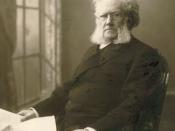In both Tennessee William's "The Glass Menagerie" and Henrik Ibsen's "Ghosts", the absent father can be seen as supportive of Derrida's theory of Differance. The privileging of binary opposites in logocentric Western thought can be seen to be overturned in both plays, and both are tragedies because of this overturning through the agency of the absent father. The role of the absent father figure in both plays is to deconstruct the family, creating tragedy. They represent a reversal of the privileging of presence/speech over absence/writing. They also fit the stereotype of the absent father in Western culture wherein the very absence of the father figure causes the family he left to fall apart. In both plays, if the father were still present, the events that occur would not take place.
According to Derrida, there is nothing outside of the text. He critiques logocentric Western metaphysics and the favouring of speech and presence over writing and absence (Grammatology 306 - 307).
He also coined the term Differance to show how words and texts deconstruct themselves (Differance 279). This is seen in both The Glass Menagerie and Ghosts, as the father figure in both plays is absent. Since neither is present to defend themselves or their actions, it is easy for the characters to attack them on a personal level such as when Amanda Wingfield says her husband left because he "fell in love with long distance". Mrs. Alving also attacks her husband, but in a less direct way. Since signifiers are endless chains never reaching a sign, we can never arrive at meaning or truth. This is because language makes this arrival impossible, consequently, there is no meaning or truth altogether, because we cannot be outside our own internal images of what is real, making those images false. This is seen...


